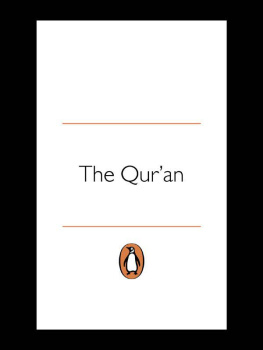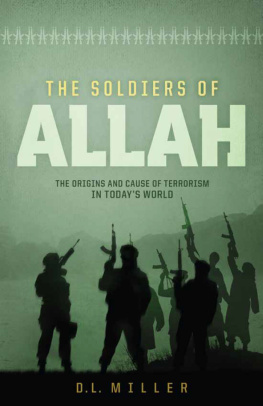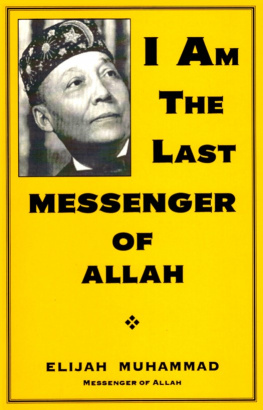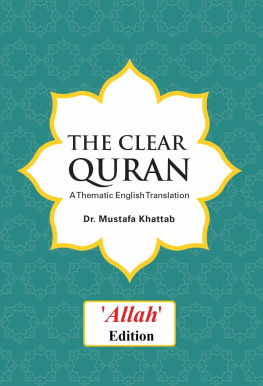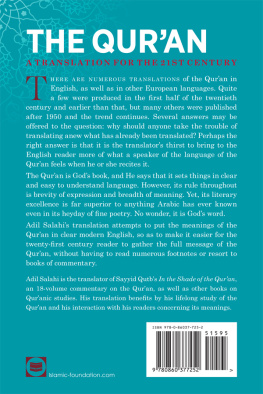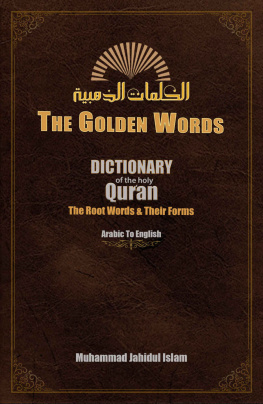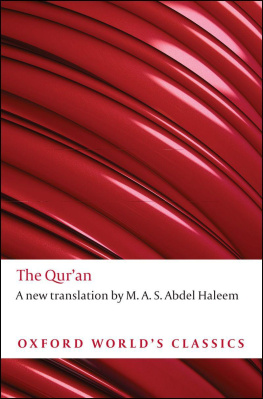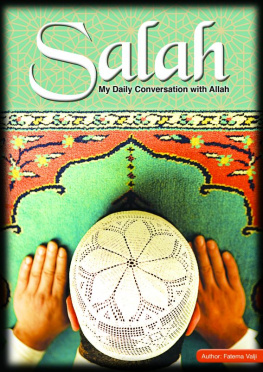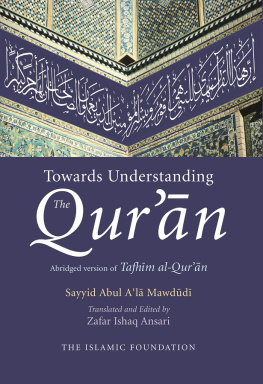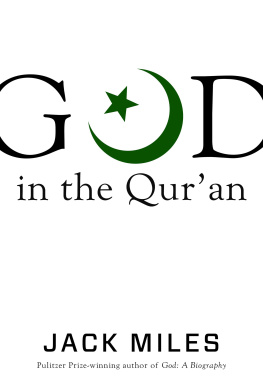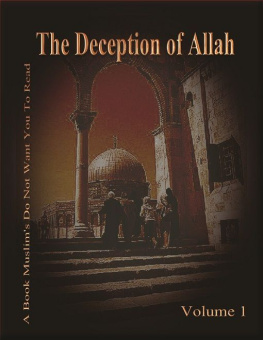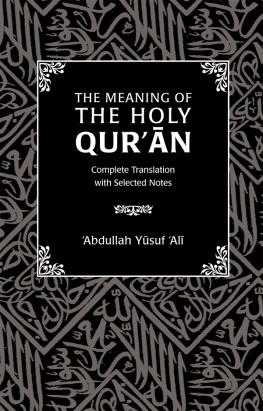God Allah - The Quran: A New Translation
Here you can read online God Allah - The Quran: A New Translation full text of the book (entire story) in english for free. Download pdf and epub, get meaning, cover and reviews about this ebook. year: 2013, publisher: Penguin Books Ltd, genre: Religion. Description of the work, (preface) as well as reviews are available. Best literature library LitArk.com created for fans of good reading and offers a wide selection of genres:
Romance novel
Science fiction
Adventure
Detective
Science
History
Home and family
Prose
Art
Politics
Computer
Non-fiction
Religion
Business
Children
Humor
Choose a favorite category and find really read worthwhile books. Enjoy immersion in the world of imagination, feel the emotions of the characters or learn something new for yourself, make an fascinating discovery.
- Book:The Quran: A New Translation
- Author:
- Publisher:Penguin Books Ltd
- Genre:
- Year:2013
- Rating:4 / 5
- Favourites:Add to favourites
- Your mark:
- 80
- 1
- 2
- 3
- 4
- 5
The Quran: A New Translation: summary, description and annotation
We offer to read an annotation, description, summary or preface (depends on what the author of the book "The Quran: A New Translation" wrote himself). If you haven't found the necessary information about the book — write in the comments, we will try to find it.
The Quran: A New Translation — read online for free the complete book (whole text) full work
Below is the text of the book, divided by pages. System saving the place of the last page read, allows you to conveniently read the book "The Quran: A New Translation" online for free, without having to search again every time where you left off. Put a bookmark, and you can go to the page where you finished reading at any time.
Font size:
Interval:
Bookmark:





Tarif Khalidi was born in Jerusalem in 1938. He received degrees from University College, Oxford, and the University of Chicago, before teaching at the American University of Beirut as a professor in the Department of History from 1970 to 1996. In 1996, Tarif Khalidi left Beirut to become the Sir Thomas Adamss Professor of Arabic at Cambridge University, the oldest chair of Arabic in the English-speaking world. He was also Director of the Centre for Middle East and Islamic Studies and a Fellow of Kings College, Cambridge. After six years, Professor Khalidi returned to the American University of Beirut, taking on the Sheikh Zayed Chair in Islamic and Arabic Studies. His books include The Muslim Jesus (2001), Arabic Historical Thought in the Classical Period (1994) and a forthcoming study of the Prophet Muhammad and the evolution of his image across time in the Islamic literary tradition.
The Quran is the axial text of a major religious civilization and of a major world language. For both Islamic civilization and the Arabic language the Quran consecrates a finality of authority granted to few texts in history. Muslim piety regards the Quran as supremely eloquent, supremely wise, and immune from all error or falsehood. Its immaculate nature extends to its physical copies, which are considered inviolable and untouchable except by one in a state of ritual purity. Good Muslim manners dictate that copies of the Quran cannot be bought, only piously bestowed in return for a pious gift from the buyer. Through the centuries, Islamic art and calligraphy have lavished upon it many of their most enduring and magnificent masterpieces. When recited, it flows with a sonority which common Muslim opinion holds to be capable of causing tears of repentance and comfort or else a shiver of fear and trembling.
As the Book of God, the divine arbiter of Muslim life and a model of Arabic usage, it sits inside a vast tradition of commentary and scholarship, Islamic and non-Islamic, pre-modern as well as modern. In the pre-modern Islamic tradition, Quranic commentary and exegesis (tafsir) was widely regarded not only as the most meritorious of the religious sciences but also as the one most fraught with danger, because of the grave consequences of error. This, however, did not prevent Muslim parties and groups from engaging in tafsir with the object of fortifying their ideological positions. The resultant corpus of tafsir contains a wide spectrum of views on the irreversible justice of God, the freedom of the human will, the divine attributes, the ultimate destiny of sinners and a host of other theological, legal and historical issues embedded in the sacred text. The greatest of these tafsirs must rank as among the most subtle and sophisticated commentaries on sacred scriptures in world literature, holding considerable interest for students of comparative religion. Unfortunately their very bulk makes their translation a colossal undertaking, denying them the wider non-Arabic readership they so thoroughly deserve.
The question now arises: can one really understand or appreciate the Quran without its tradition of commentary? Can a reader who knows little or nothing of its cultural background make sense of its allusive references or its frequent ad hoc pronouncements? For the scholars of Islam, mastery of the various sub-disciplines of Quranic exegesis has always been regarded as an essential prerequisite to authoritative understanding. Among these disciplines are the subsidiary sciences of tafsir such as asbab al-nuzul (historical context), al-nasikh wal mansukh (harmony of laws), gharib al-Quran (linguistic obscurities), qiraat (variant readings), irab (grammar), istiarat (metaphors), badai (rhetorical excellences) and ijaz (divinely ordained inimitability). It was upon these sciences that the great exegetes of the Quran built their authority. Yet within these fields, controversy was always rife and vivid. No scholar of exegesis would advance an opinion without first engaging with his fellow exegetes, past and contemporaneous. Consensus on a point of interpretation was hard to come by, even on what appear to be simple or straightforward legal or linguistic points. On the larger and more divisive theological issues the debate among exegetes has always contained a wide spectrum of views.
However, despite the claims of the exegetes that full understanding of the Quran must pass through their scholarly portals, it was recognized from an early period that the Quran was, in a memorable phrase, hammalu awjuhin (a bearer of The leeway granted to interpretation issued from the Qurans own classification of its verses as muhkam or mutashabih (Q. 3:7). The word muhkam has commonly been understood to mean explicit, clear-cut, fully intelligible, while mutashabih has been taken to mean indeterminate, with multiple meanings or even ambiguous. Under muhkam, the exegetes typically included the body of detailed legislation and moral injunctions in the Quran, while mutashabih included words and verses which, among other matters, referred to Gods attributes and His relationship to the created world. Here, for example, is how the renowned theologian and exegete Fakhr al-Din al-Razi (d. 1209) dealt with the question of certain problematic attributes of God such as His anger, joy, cunning and love. If taken literally, these can bring God dangerously near to human emotions:
All psychic symptoms, by which I mean such things as mercy, joy, pleasure, anger, shyness, cunning and mockery, have their origins and their ends. Take anger for example. Anger originates with the boiling of the blood of the heart while its end is the desire to inflict harm upon the object of anger. When applied to God, the term anger cannot be taken to refer to its origin, which is the boiling of the hearts blood, but to its end, which is the desire to inflict harm.
This is an example of how certain exegetes, particularly the rationalists among them, have dealt with the problem of Gods seemingly human attributes, though other exegetes would argue that such attributes must be accepted on faith and are beyond rational investigation. Regardless of the interpretive strategy adopted, a common view held among exegetes is that the ambiguous or mutashabih terms or phrases of the Quran were deliberately designed by God to stimulate thinking, and are thus very much in line with the Qurans frequent exhortations to mankind to reflect upon the created universe. The exegetes have quite naturally insisted upon mastery of the scholarly curriculum before interpretation can be undertaken, and yet the repeated invitation to mankind to exercise their reason is as timeless, universal and imperative as anything else in the Quranic text itself.
If we turn back to the questions posed above, we might argue that a knowledge of, say, conditions in pre-Islamic Arabia would clearly enhance contextual understanding of the Quran. But the very allusiveness of the text, its impersonality, its meta-historical tone, seem almost deliberately to de-emphasize context, and to address its audience or readers in a grammatical tense that I have elsewhere called the eternal present tense. Yes, the Quran explicitly recognizes the danger of a wilfully perverted reading of the text, but if approached in a pious frame of mind, or what today we might call sympathy, interpretation must in theory be limitless, since God alone is its perfect interpreter (Q. 3:7). Thus, of all sacred texts, the Quran is perhaps the one that most self-consciously invites its readers to engage with it exegetically.
Font size:
Interval:
Bookmark:
Similar books «The Quran: A New Translation»
Look at similar books to The Quran: A New Translation. We have selected literature similar in name and meaning in the hope of providing readers with more options to find new, interesting, not yet read works.
Discussion, reviews of the book The Quran: A New Translation and just readers' own opinions. Leave your comments, write what you think about the work, its meaning or the main characters. Specify what exactly you liked and what you didn't like, and why you think so.

